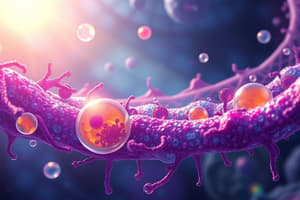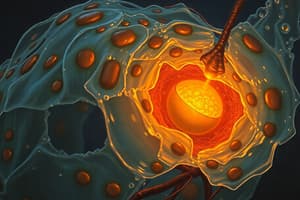Podcast
Questions and Answers
What is the study of living organisms and their interactions with each other and their environments?
What is the study of living organisms and their interactions with each other and their environments?
Biology
What is the subfield of biology that focuses on the study of cells?
What is the subfield of biology that focuses on the study of cells?
Cell biology
What is the control center of the cell and contains the cell's DNA?
What is the control center of the cell and contains the cell's DNA?
Nucleus
What are the specialized structures that perform specific functions within the cell?
What are the specialized structures that perform specific functions within the cell?
What is the process in which a cell undergoes a series of processes resulting in the formation of two genetically identical daughter cells?
What is the process in which a cell undergoes a series of processes resulting in the formation of two genetically identical daughter cells?
What involves the release of chemical messengers that bind to specific receptors on the surface of the target cell?
What involves the release of chemical messengers that bind to specific receptors on the surface of the target cell?
Study Notes
Biology is the study of living organisms and their interactions with each other and their environments. Cell biology is a subfield of biology that focuses on the study of cells, which are the basic unit of life. Cells are complex structures that carry out a wide range of functions essential to the survival and growth of organisms.
Cells are made up of a variety of organelles, which are specialized structures that perform specific functions within the cell. The nucleus, for example, is the control center of the cell and contains the cell's DNA. The mitochondria are responsible for producing energy for the cell, while the endoplasmic reticulum and Golgi apparatus play roles in protein synthesis and modification.
Cells can exist in two states: interphase and mitosis. In interphase, the cell is in its resting state and is preparing for cell division. During mitosis, the cell undergoes a series of processes that result in the formation of two genetically identical daughter cells. Mitosis is essential for growth and development, as well as for the repair and maintenance of tissues.
Cells also have the ability to communicate with each other through a process called signaling. Signaling involves the release of chemical messengers, called hormones, which bind to specific receptors on the surface of the target cell. This triggers a cascade of intracellular events that ultimately result in a change in the behavior of the target cell.
Cells also have the ability to adapt to changes in their environment. This is accomplished through a process called cell differentiation, in which cells become specialized to perform specific functions. For example, skin cells become specialized to protect the body from external harm, while muscle cells become specialized to generate movement.
Cell biology is a fascinating and important field of study that has applications in a wide range of areas, including medicine, agriculture, and biotechnology. The study of cells allows us to understand the fundamental processes of life, and to develop new technologies and treatments for a variety of diseases.
Studying That Suits You
Use AI to generate personalized quizzes and flashcards to suit your learning preferences.
Description
Explore the fascinating world of cell biology, focusing on the structure and function of cells, including organelles, cell states, communication, adaptation, and their applications in various fields. Learn about the fundamental processes of life and their significance in medicine, agriculture, and biotechnology.




